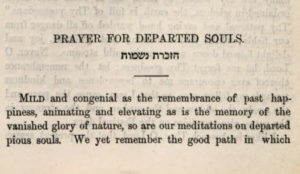| Contribute a translation | Source (English) |
|---|---|
Mild and congenial as the remembrance of past happiness, animating and elevating as is the memory of the vanished glory of nature, so are our meditations on departed pious souls. We yet remember the good path in which they walked, and thus the virtue of parents descends to their children, the wife bereaved of her husband, acts in the spirit of her late partner in life! the piety of the father is preserved in those whom he guided by good example in the fear of God; and the deceased friend is even in yonder life the guardian angel of the friend he left behind. | |
O may our minds in this hour, which is devoted to the memory of our dear friends and relatives departed, become penetrated with the recollection of the righteous lives of our ancestors, Abraham, Isaac and Jacob, who rest with Thee, O Lord! as also the virtuous life of my deceased (parents, grandparents, husband,) so that my walk of life be acceptable unto Thee, and that their noble spirit continue to live within me. And when my ashes shall be gathered to those of my fathers in the silent grave, may my memory also continue to live as a blessing. | |
May my spirit gather strength from the remembrance of the noble-minded deceased, to walk in their path; to find peace of conscience through fidelity in the hour of trial, through courage in suffering; to suppress the most ardent desires, when duty requires it. And when I shall once enter the field of the departed, leaving the rough road of this life behind me, then may my virtues be my conducting angels; and become a perpetual estate and inheritance, which, as we are taught by our sages, will remain imperishable to eternity. | |
Verily, Father of all! whoever dedicates his life unto Thee, whoever walks in the path of virtue towards the land of the immortal, whoever distinguishes his earthly career by charity and benevolence, will follow joyfully from the misty dawn of earthly life to the morning of eternity, when Thou all-just God, beckonest him to complete his course. Whoever has lived virtuously may meet death as a friend, as it will but summon him to the harvest of his good deeds; it is to him what sleep is to the weary pilgrim, what liberty is to the slave what the glad awakening is to the troubled dreamer. Here truth has to struggle with superstition; here light has to combat darkness; here I stand under the influence of the world without; but there—in the fields of the pure exercise of virtue— there is nothing but truth and light; for with Thee only, O Father, there is truth, with Thee only there is the pure light. | |
Grant, O Lord, that I may appreciate and exercise the great domestic virtues: FIDELITY and CHASTITY as did our departed mothers, Sarah, Rebecca, Rachel and Leah, whose memory be mentioned this day for a blessing. Bless me, as Thou didst the pious Hannah, with resignation and forbearance; in order that I may comfort myself, even when many joys of life flee away, with the reflection of the sages כל מה דעביר רחמנא לטב עביד “Whatever the Lord doeth, is for our good” (Shulḥan Arukh Oraḥ Ḥayyim 230.4). If in Thy impenetrable justice Thou deprivest me of a precious gift, of a dear friend or relative, I will unshaken and full of confidence exclaim יי נתן יי לקח יהי שם יי מבורך “The Lord gave and the Lord hath taken away, blessed be the name of the Lord (Job 1:21)”— מעתה ועד עולם from henceforth until evermore. (Psalms 113:2) Amen. |
“Prayer in Memory of Departed Souls,” alternately titled, “Prayer for Departed Souls (הזכרת נשמות)” by Marcus Heinrich Bresslau was first published in his תחנות בנות ישראל Devotions for the Daughters of Israel (1852), p. 40-42.
In his preface to Devotions, Bresslau is clear that his prayers in English were adapted from traditional teḥinot that had earlier been published in France, Germany, and Poland. If you know of a specific prayer that may have served as the basis for this one, please leave a comment or contact us.
Source(s)


“Prayer in Memory of Departed Souls (הזכרת נשמות), by Marcus Heinrich Bresslau (1852)” is shared through the Open Siddur Project with a Creative Commons Public Domain Dedication 1.0 Universal license.


![Fürbitte für die Verstorbenen [no.1] (Yehoshua Heshil Miro 1835) - cropped](https://opensiddur.org/wp-content/uploads/2022/03/Furbitte-fur-die-Verstorbenen-no.1-Yehoshua-Heshil-Miro-1835-cropped.png)
![Fürbitte für die Verstorbenen [no.2] (Yehoshua Heshil Miro 1829) - cropped](https://opensiddur.org/wp-content/uploads/2022/03/Furbitte-fur-die-Verstorbenen-no.2-Yehoshua-Heshil-Miro-1829-cropped-1.png)
![Fürbitte für die Verstorbenen [no.3] (Yehoshua Heshil Miro 1833) - cropped](https://opensiddur.org/wp-content/uploads/2022/03/Furbitte-fur-die-Verstorbenen-no.3-Yehoshua-Heshil-Miro-1833-cropped.png)





Leave a Reply